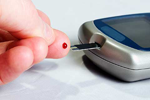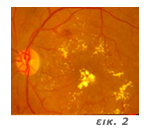Diabetes and our eyes
What is it?
 The human body has a hormone, insulin, that regulates blood glucose levels. If our body does not secrete enough insulin or does not respond properly to it, this can lead to higher than normal blood glucose level. In this pathological condition, we have a systemic disease, Diabetes Mellitus with significant long term effects on the eyes.
The human body has a hormone, insulin, that regulates blood glucose levels. If our body does not secrete enough insulin or does not respond properly to it, this can lead to higher than normal blood glucose level. In this pathological condition, we have a systemic disease, Diabetes Mellitus with significant long term effects on the eyes.
How does Diabetes affect our eyes?
Patients with diabetes may experience significant problems with their eyes, such as:
- Diabetic retinopathy - with significant vision loss
- Cataract (often at younger ages)
- Glaucoma (Increased intraocular pressure with damage of the optic nerve)
- Ischemic optic neuropathy (very severe - irreversible - damage of the optic nerve)
Patients with diabetes can also visit the ophthalmologist with complaints about temporary blurred vision, and "floaters" or chronic symptoms related to the anterior segment of the eye.
What is Diabetic Retinopathy?
 Diabetic retinopathy is one of the most serious complications of diabetes that affects the fundus of the eye. It occurs after about 8-12 years of chronically increased blood glucose levels. The first stage of the disease is called non-proliferative diabetic retinopathy, which is characterized by "leakage" and small bleeds from the vessels of the fundus (fig.2)
Diabetic retinopathy is one of the most serious complications of diabetes that affects the fundus of the eye. It occurs after about 8-12 years of chronically increased blood glucose levels. The first stage of the disease is called non-proliferative diabetic retinopathy, which is characterized by "leakage" and small bleeds from the vessels of the fundus (fig.2)
At this stage, the vision can significantly worsen if bleeds occur in the macula, which is responsible for our central vision.
 The second stage is called proliferative diabetic retinopathy when extensive ischemia leads to formation of "fragile" abnormal new blood vessels (fig.3), which may lead to vitreous hemorrhage, retinal detachment or development of neovascular glaucoma.
The second stage is called proliferative diabetic retinopathy when extensive ischemia leads to formation of "fragile" abnormal new blood vessels (fig.3), which may lead to vitreous hemorrhage, retinal detachment or development of neovascular glaucoma.
How is diabetic retinopathy treated?
Diabetic retinopathy is treated with:
- Regular monitoring in the early stages (special tests, e.g. fluorescein angiography, OCT)
- Laser applied to macular edema or newly formed blood vessels
- Injection therapy with excellent results
- Surgery at an advanced stage of bleeding or retinal detachment
What should the patient with diabetes do?
The patient should initially regulate the blood sugar level with the help of a diabetes specialist. Then he/she should visit an ophthalmologist and undergo general ophthalmologic examination and fundoscopy on an annual basis. Re-examination is decided by the ophthalmologist, and depends on the results of the annual screening.
Unregulated long term diabetes eventually causes severe damage to tissues, destroying peripheral nerves, blood vessels of kidneys, heart, brain, and, of course, eyes. However, preventive screening helps ophthalmologist and diabetes specialist to maintain stable condition of the patient, with good quality of life.
Digital content is courtesy of Alcon Iberia
Digital content: Credit to National Eye Institute, National Institutes of Health.




